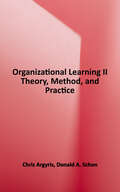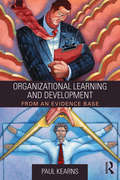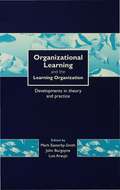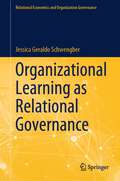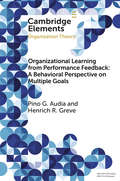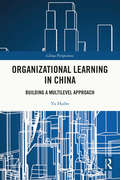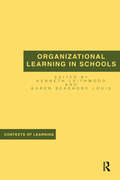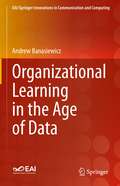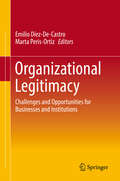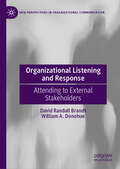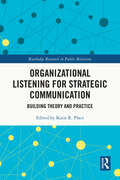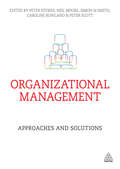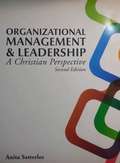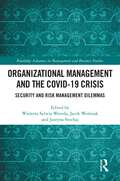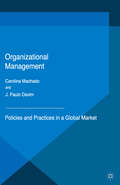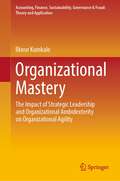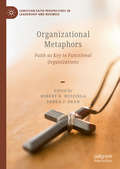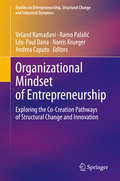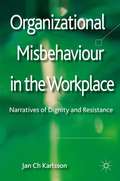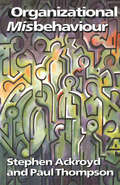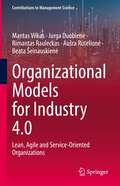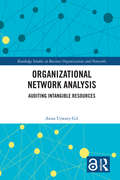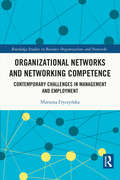- Table View
- List View
Organizational Learning II: Theory, Method, And Practice (Addison-wesley Od Ser.)
by Donald A. Schon Chris ArgyrisA member of the PH OD Series! Organizational Learning II expands and updates the ideas and concepts of the authors’ ground- breaking first book. With new examples and the most up-to-date information on the technical aspects of organizational and management theory, Argyris and Schon demonstrate how the research and practice of organizational learning can be incorporated into today’s business environment.
Organizational Learning and Development: From an Evidence Base
by Paul KearnsIt is now widely accepted that organizational maturity is dependent on being able to reorganize on a continuous basis and learn faster and more effectively than your competitors. Organizations that want to be sure they are competing at the highest level need clear indicators that their organizational learning and development capability is fully functional. This new book by Paul Kearns focuses on the need for an evidence-based approach to learning and development, bringing together the author’s extensive knowledge of HRM and organizational learning with new developments in the field. The book demonstrates how evidence evaluation can improve professionalism in organizational design and development, showing that this approach can create value not just for shareholders, but for employees and society as a whole. Organizational Learning and Development: From an Evidence Base is the perfect book for postgraduate students studying on evidence-based HRM courses and for the reflective learning and development practitioner.
Organizational Learning and the Learning Organization: Developments in Theory and Practice
by Mark Easterby-Smith Luis Araujo John G Burgoyne`The introduction chaper by Mark Easterby-Smith and Luis Araujo introduces the reader to the unresolved issues with which the field is still grappling today.... All in all, this is an interesting and useful book for both researcher and manager alike. First, and perhaps most importantly, the book incorporates multiple perspectives on learning - the psychological, sociological and the philosophical... Second, the book is neither purely theory driven, nor purely empirically driven. Theoretical contributions are complemented by empirical studies which help to illustrate the application of the theoretical contructs. I suspect that this would be of immense value to the practicing manager. Finally, the book provides a critical commentary on the state of the field in a nice compact way which should enhance its value to scholars in this area... a book which is both useful and interesting' - Organisational Studies `[M]ost importantly, the book incorporates multiple perspectives on learning - the psychological, sociological and the philosohical... provides a critical commentary on the state of the field in a nice, compact way which should enhance its value to scholars' - Organization Studies `A valuable resource for academics and practitioners in management and corporate strategy, as well as those involved in mangement training and development' - European Foundation for Management Development `This is a particularly interesting and useful work because it combines some chapters which deal primarily in concepts or indeed theories, and others which describe the experiences of trying to carry out the practices involved in creating both/either organisational learning and/or the learning organisation' -Industrial and Commercial Training 'The editors' overall assessment is that there has been insufficient dialogue between the two camps of action research and theorizing.... As a contribution to mapping this divided house, the text is an apt illustration of these problems. The editor's overview is of interest...' - Stephen Gibb, University of Strathclyde, MCB University Press The debates surrounding concepts of `organizational learning' and the `learning organization' receive a welcome synthezis in this book. International experts explore the links between the two fields of enquiry, which hitherto, despite their intersecting concerns, have represented separate constituencies, literatures and perspectives. The book provides a much-needed integrated framework of concepts and theories which draws on current insights from management cognition, theories of knowledge and learning, management practice and work psychology.
Organizational Learning as Relational Governance (Relational Economics and Organization Governance)
by Jessica Geraldo SchwengberThis book critically examines existing organizational learning theories that often center on employees and adopt a neo-classical organizational view. In this book, organizational learning (OL) is conceptualized from a relational governance perspective. Departing from the relational economics approach, it describes organizations as dynamic nexuses of stakeholders' resources and interests, extending beyond conventional intra-organizational contexts to encompass an open systems view. By viewing organizations as independent entities, distinct from individual stakeholders, the author introduces the concept of transactions as the fundamental unit of analysis in organization theory. Stakeholders contribute diverse rationalities, and OL emerges as the process of relationalizing these rationalities, enabling multi-contextual transactions within organizations. This book sheds light on epistemological and ontological challenges in OL literature, such as the OL paradox and anthropomorphism. To address these issues, the author advocates a shift from methodological individualism to methodological relationism, wherein OL becomes a micro-meso-relational process involving both stakeholders and the organization as an entity. Combining conceptual insights with empirical evidence from a multinational company's case study, the book showcases how relational learning can be practically applied in organizations. The findings corroborate the conceptual framework, supporting the notion of organizations as resource-rich nexuses and learning as a comprehensive relational process involving both entities and stakeholders. This book offers an essential contribution to the field. It appeals to scholars and practitioners interested in organizational studies, corporate governance, and relational economics.
Organizational Learning from Performance Feedback: A Multiple Goals Perspective (Elements in Organization Theory)
by Henrich R. Greve Pino G. AudiaThis Element synthesizes the current state of research on organizational learning from performance feedback and develops a new perspective that deals with the influence of multiple goals. In keeping with the centrality of motives in Cyert & March's influential model, this new perspective rests on a foundation of individual level behaviors that are responsive to mechanisms at the organizational and environmental level of analysis. A key aim is to lay out an agenda for a new wave of empirical research on the interconnections of decision-makers, organizations, and the environment that influence organizational responses to performance.
Organizational Learning in China: Building a Multilevel Approach (China Perspectives)
by Yu HaiboFrom the perspective of behavioural science, this book systematically investigates organizational learning in Chinese organizations bsed on multilevel theory over the past 20 years. The findings contribute to the theory and practice of organizational learning and give insights into the construction of learning organizations.Revisiting existing studies on organizational learning, the author reconceptualises organizational learning and constructs an integrative model, which is corroborated and then supplemented by empirical research. Based on samples and materials from 3,000 managers and employees in organizations from all over China, the book further elaborates this integrative model covering the multilevel structure, trans-level functions and generative mechanisms that figure prominently in organizational learning in Chinese organizations. This framework helps enhance the organizational learning ability and the establishment of a learning culture, while offering possible directions for updating research methods and a stereoscopic theory of organizational learning.The book will be a good reference for management practitioners, students and academics interested in organizational behaviour, human resource management, innovation management, and multilevel perspective.
Organizational Learning in Schools
by Kenneth Leithwood and Karen Seashore LouisThis volume presents the view that what matters most are learning processes in organizations and ways of enhancing the sophistication and power of these processes. Each contributor, therefore, explicitly addresses the meaning(s) of organizational learning which they have adopted themselves.
Organizational Learning in the Age of Data (EAI/Springer Innovations in Communication and Computing)
by Andrew BanasiewiczThis book discusses the impact of advanced information technologies, such as data processing, machine learning, and artificial intelligence, on organizational decision-making processes and practices. One of the book’s central themes is the interplay between human reasoning and machine logic in the context of organizational functioning, specifically, the fairly common situations in which subjective beliefs are pitted against objective evidence giving rise to conflict rather than enhancing the quality of organizational sensemaking. Aiming to not only raise the awareness of the potential challenges but also to offer solutions, the book delineates and discusses the core impediments to effective human-information technology interactions, and outlines strategies for overcoming those obstacles on the way to enhancing the efficacy of organizational decision-making.
Organizational Legitimacy: Challenges And Opportunities For Businesses And Institutions
by Marta Peris-Ortiz Emilio Díez-De-CastroThis volume explores organizational legitimacy in business, featuring examples from a variety of industries around the world. Synthesizing the most current theoretical insights and best practices, the contributing authors examine the ways in which organizational legitimacy can be understood, its perceived influence on the market, and the relationship between organizational legitimacy and overall organizational success. The authors draw from different methodological perspectives to develop a holistic approach to organizational legitimacy that transcends the traditional concepts of corporate reputation, business ethics or corporate social responsibility. Historically, efforts to understand how organizations acquire, manage and use legitimacy have applied insights from institutional theory, resource dependence theory, organizational ecology and stakeholder theory, but the field has remained fragmented, despite the profound implications of achieving legitimacy for ensuring organizational stability, survival and sustainability through access to capital, resources and business opportunities, as well as problem solving, performance measurement and stakeholder support. Presenting case studies of successful initiatives, the book addresses: · How organizational legitimacy is defined and measured · How organizations achieve legitimacy and how they acquire resources · How different stakeholders (e.g., consumers, investors, employees) make legitimacy judgments and resource allocation decisions · Whether audiences in the same socio-cultural context arrive at shared legitimacy judgments with regard to a focal organization
Organizational Listening and Response: Attending to External Stakeholders (New Perspectives in Organizational Communication)
by William A. Donohue David Randall BrandtThis book argues that listening to constituents who reside outside organizational boundaries, but who are essential members of an organization’s ecosystem, is a vital constitutive element of organizational communication. It also attempts to demonstrate that, by and large, the field of organizational communication has neglected such listening. The book goes on to introduce a conceptual and methodological framework organizations can use to assess listening practices and effectiveness. Through a combination of theory, research, and case illustrations, the book will be valuable to both scholars and practitioners in the fields of organizational communication, marketing, and public relations. It will provide insight and direction for theory-building, knowledge development, and implementation of best practices.
Organizational Listening for Strategic Communication: Building Theory and Practice (Routledge Research in Public Relations)
by Katie R. PlaceEmbracing listening as a useful tool for strengthening organization-publics and organization-employee relationships, this book offers theoretical and practical insights for listening across myriad strategic communication contexts. Chapters authored by a diverse global collective of communication scholars and professionals present original research and case examples of listening for strategic communication in corporate, government, and nonprofit environments. They explore topics such as utilizing artificial intelligence and social media; activism, social justice, and ethics; and fostering diversity, equity, and inclusion within and outside organizations. Each chapter concludes with recommendations for strategic communication practice. This book will be of interest to researchers and advanced students in public relations and strategic communication, organizational communication, and listening.
Organizational Management
by Peter Scott Neil Moore Caroline Rowland Professor Peter Stokes Simon M SmithOrganizational Management is ideal for readers who need to understand modern organizations. This book enables students to understand the key issues of organizational behaviour and how to take a critical approach when planning, leading and engaging a workforce and its resources. The book provides fresh perspectives on known models and critical theories on leadership, teams, performance management, employee engagement and change. The authors also offer the reader innovative approaches to leading-edge issues such as trust, internet use, generational trends, the use of the arts in organizations and leadership from a systemic perspective. Organizational Management draws on examples from the authors' international work across a range of business and industrial sectors, both public and private, and is supplemented by activities, revision questions, recommend reading and online resources to deepen learning.Rapid technological advances, constantly changing global environments and new kinds of workforce cultures mean that organizations are constantly being challenged. This book equips the reader with the ability to navigate this turbulent environment through both established and novel forms of organizational management.
Organizational Management and Leadership: A Christian Perspective (2nd Edition)
by Anita SatterleeOrganizational Management and Leadership: A Christian Perspective was written to provide the essential skills and knowledge needed to effectively lead and manage in contemporary organizational environments. While most books on the subject focus almost entirely on the business needs of large corporate operations, Organizational Management and Leadership: A Christian Perspective recognizes that the vast majority of readers are not employed by large corporations whose primary purpose is shareholder wealth and bureaucracy. Rather, the average reader is employed in a variety of small-to-medium organizations, be they for-profit, not-for-profit, or governmental. While some books published in the popular press discuss Christian aspects of doing business, they do not integrate academic content and practice with the Biblical principles. Herein lies the great value of Organizational Management and Leadership: A Christian Perspective to the Christian Higher Education community: the first textbook in the field which allows the student to integrate Biblical principles with academic and practical learning.
Organizational Management and the COVID-19 Crisis: Security and Risk Management Dilemmas (Routledge Advances in Management and Business Studies)
by Wioletta Sylwia Wereda Woźniak Jacek Stochaj JustynaThe COVID-19 pandemic has re-shaped organizations on many levels: resource, process, structural and relational. Such a wide range of forced changes has resulted in a greater need to implement risk management principles and procedures to secure an organizations position in the market. This book presents selected and key aspects of managing contemporary organizations in the conditions of the COVID-19 pandemic, enriched with empirical analyzes relating to various countries of the world. This edited collected focuses on clarifying and solving basic management dilemmas, integrated issues of risk management and organization security in light of changes during the COVID-19 pandemic. It specifically explores the following common problem areas, across industries and sectors, using theoretical, empirical and practical perspectives: - financial, economic and regulatory conditions for management processes in the conditions of the COVID-19 pandemic; - management of information resources and security in the conditions of the development of the phenomenon of digital risk and e-commerce; - shaping relationships with stakeholders - with particular emphasis on relationships with customers in the conditions of sales processes; - shaping the processes of creating and diffusing knowledge, with particular emphasis on the activities of educational entities. Organizational Management and the COVID-19 Crisis will be directly relevant for researchers and academics across a range of management disciplines, including strategic management, risk management, organizational studies, information and knowledge management and related fields.
Organizational Management: Policies and Practices (Management And Industrial Engineering Ser.)
by J. Paulo Davim Carolina MachadoOrganizations are increasingly facing continuous and highly complex changes that require more proactive strategies, policies and management practices. Conscious of this reality, this book provides information and debate on principles, strategies, models, techniques, methodologies and applications of organizational management in the field of industry, commerce and services. Organizational Management communicates the latest developments and thinking on the organizational management subject world-wide, and seeks cultural and geographic diversity in studies and uses of organizational management that have a special impact on organizational communications, change processes and work practices. With an emphasis on the way organizations define and develop their management policies and practices in order to acquire more competitive advantages in the global market, this book is crucial to any practitioner or researcher of current organizational management.
Organizational Management: Policies and Practices in a Global Market
by J. Paulo Davim Carolina MachadoOrganizational Management.
Organizational Mastery: The Impact of Strategic Leadership and Organizational Ambidexterity on Organizational Agility (Accounting, Finance, Sustainability, Governance & Fraud: Theory and Application)
by İlknur KumkaleThis book examines the impact of strategic leadership and organizational ambidexterity skills on the strategic agility of a particular organization in four parts. In the first part, the concept of ambidexterity is discussed and the issue of organizational ambidexterity is explained with its dimensions. Exploratory and beneficiary innovation abilities as well as adaptability and alignment are examined as sub-dimensions. In the second part, the concept of strategic leadership is expanded upon, first conceptually and then across five dimensions: managerial strategic leadership, transformational strategic leadership, political strategic leadership, communicative strategic leadership, and ethical strategic leadership. The third part focuses on strategic agility. The beginning of the concept of agility, organizational agility, and the importance of agility are explained across the dimensions of competence, flexibility, responsiveness, and speed. The fourth part focuses on field study, and the results are evaluated by analyzing the data obtained from surveys of managers of large and medium-sized enterprises. This book would be a valuable read for academics, bachelor, and graduate students in managerial sciences and business leaders.
Organizational Metaphors: Faith as Key to Functional Organizations (Christian Faith Perspectives in Leadership and Business)
by Robert B. Huizinga Debra J. DeanThis edited volume expands on Morgan's organizational metaphors through the lens of faith to illuminate organizational function. Part I uses metaphor to illustrate dysfunctional organizations, including the impact of dysfunction upon organizational trust, performance, and longevity. Part II examines the progression from a dysfunctional organization to one that exhibits functionality. Finally, the last section discusses healthy organizations. Metaphors used in this book include Pygmalion organizations, organizational zombies, and organizations as vineyards. This book offers new metaphors that can be applied in organizational theory.
Organizational Mindset of Entrepreneurship: Exploring the Co-Creation Pathways of Structural Change and Innovation (Studies on Entrepreneurship, Structural Change and Industrial Dynamics)
by Léo-Paul Dana Veland Ramadani Norris Krueger Ramo Palalić Andrea CaputoThis book focuses on how to promote innovation and an entrepreneurial mindset within organizations in the context of structural changes. It highlights the importance of internal marketing of innovation and ideas among employees, of creating collaborative spaces, and of company leaders promoting collaboration. The key aspect in all contributions gathered here is to understand the co-creation paths of structural change and innovation, and how they contribute to competitive advantage. The respective chapters address topics such as intrapreneurship, organizational mindset, creating an entrepreneurial orientation, strategic leadership, and internal & external organizational networking. All contributions are based on the latest empirical and theoretical research, and provide key findings and concrete recommendations for organizations.
Organizational Misbehaviour in the Workplace
by Jan Ch. KarlssonEmployees need dignity and autonomy in their workplace. If they are denied this there will be a strong tendency to resist working conditions and misbehave. The theme of this book is how employees try to establish and maintain dignity and itincludes a wealth of gripping, funny and tragic stories about workers' and managers' creative ways of doing that narratives that make us reflect upon how employees are treated at work and the consequences thereof. Jan Ch. Karlsson presents a new model for analyzing these processes in working life. The model integrates themes that have usually been regarded as separate entities, such as organizational misbehaviour, resistance, abusive supervision, discipline in informal self-organised groups at workplaces, and doing private business during working hours. Through this model a fascinating novel perspective is suggested on what is currently happening in the modern workplace. "
Organizational Misbehaviour: SAGE Publications
by Professor Paul Thompson Stephen Ackroyd'[A] textbook specifically aimed at organizational misbehaviour. ...it certainly fills a gap... containing a large survey of academic literature on the subject. The book is good: it brings to light subjects which are too often negleced, and it provides an understanding of phenomena which are so common in organizations, but at the same time so vague and incomprehensible' Organization Studies From `soldiering' and absenteeism to humour in organizations and the emergence politics of sexuality, this book explores the latest forms of organizational subversion and offers fresh insights of the underlying dynamics of management and organizational processes. The book opens with a critique of orthodox organizational analysis and maps out the wide terrain across which organizational `misbehaviour' occurs. The authors go on to examine the interconnections between identity formation, the pursuit of autonomy and organizational misbehaviour, and explore how clearly the tendency to misbehave is deeply embedded in organizational life.
Organizational Models for Industry 4.0: Lean, Agile and Service-Oriented Organizations (Contributions to Management Science)
by Jurga Duobienė Mantas Vilkas Rimantas Rauleckas Aušra Rūtelionė Beata ŠeinauskienėThis book draws on a neo-institutional theory to characterize service-oriented manufacturing firms in relation to more familiar organizational forms, such as lean and agile. It sheds light on whether being lean is a prerequisite for agile organizations and whether agile organizations are precursors of service-oriented organizations. The book empirically examines the prevalence of such organizations using representative samples of manufacturing firms in an industrialized country. This approach makes it possible to “zoom in” and determine whether the extent of adoption of digital manufacturing innovations, digital services, and service-oriented business models varies with organizations’ size, industry, product complexity, lot size, type of design process, and type of manufacturing process. In turn, it shows which digital manufacturing innovations, lean practices, and services contribute to leanness-related performance capabilities like quality and costs; agility-related capabilities like fast delivery, flexibility and innovation; and service-oriented capabilities like high service performance and digitalization. In addition, it explores the question of whether lean, agile, and service-oriented performance capabilities contribute to financial performance separately or jointly.
Organizational Myopia
by Maurizio CatinoCould the terrorist attacks on the Twin Towers have been avoided? What about the control failures in the recent global financial crisis? Behind these apparently very different events, it is possible to identify a common element of organizational myopia - a syndrome that severely limits the capacity of organizations to foresee the effects of their own decisions and to recognize signs of danger or opportunity. Organizational Myopia explores the barriers that impede organizations from identifying an effective response to the problems that they have to confront. Using real-world cases, the author investigates the mechanisms that generate myopia in organizations at the individual, organizational, and interorganizational level in contexts that are complex, uncertain, ambiguous, and changeable. This book will help readers understand how to limit the origins of myopia and therefore increase the capacity of organizations to anticipate and contain unexpected events.
Organizational Network Analysis: Auditing Intangible Resources (Routledge Studies in Business Organizations and Networks)
by Anna Ujwary-GilThe integrated meta-model for organizational resource audit is a consistent and comprehensive instrument for auditing intangible resources and their relations and associations from the network perspective. This book undertakes a critically important problem of management sciences, poorly recognized in literature although determining the current and future competitiveness of enterprises, sectors and economies. The author notes the need to introduce a theoretical input, which is manifested by the meta-model. An expression of this treatment is the inclusion of the network as a structure of activities, further knowledge as an activity, and intangible assets as intellectual capital characterized by a structure of connections. The case study presented is an illustration of the use of network analysis tools and other instruments to identify not only the most important resources, tasks or actors, as well as their effectiveness, but also to connect the identified networks with each other. The author opens the field for applying her methodology, revealing the structural and dynamic features of the intangible resources of the organization. The novelty of the proposed meta-model shows the way to in-depth applications of network analysis techniques in an intra-organizational environment. Organizational Network Analysis makes a significant contribution to the development of management sciences, in terms of strategic management and more strictly resource approach to the company through structural definition of knowledge; application of the concept of improvement-oriented audit abandoning a narrow understanding of this technique in terms of compliance; reliable presentation of audits available in the literature; rigorous reasoning leading to the development of a meta-model; close linking of knowledge and resources with the strategy at the design stage of the developed audit model, including the analysis of link dynamics and networks together with an extensive metrics proposal; an interesting illustration of the application with the use of metrics, tables and charts. It will be of value to researchers, academics, managers, and students in the fields of strategic management, organizational studies, social network analysis in management, knowledge management, and auditing knowledge resources in organizations.
Organizational Networks and Networking Competence: Contemporary Challenges in Management and Employment (Routledge Studies in Business Organizations and Networks)
by Marzena FryczyńskaNetworks and networking are essential concepts that transform organizational, economic, and social practices. Human capital is both a source of competitive advantage and a value that allows individual employees to develop their careers and find satisfaction in their employment. The book addresses the vital issue of changes occurring in management and employment, with the growing career individualization, focus on future professional challenges, importance of knowledge workers, and possibilities of functioning in social and organizational networks. Workers’ networking competence is the main theme of this book. Much attention is put on differentiating it from other types of competence and other network objects, and identifying its behavioral manifestations, as the frequency of such behaviors can be used as a measure of an individual’s networking competence level. Employment-related variables and characteristics that affect networking competence are analyzed in depth, as is the impact of networking competence on career success and employability — thus laying a foundation for transformation in network organization management, employee relations, and individual career development. It will be of interest to researchers and students alike, as it clearly demonstrates a way to solve research problems in management science and provides new instruments for further research on networks and networking; and to organization managers and employees, as it offers insights into management and employment-related trends as well as guidelines for managing network organizations and building one’s career within social and organizational networks.
